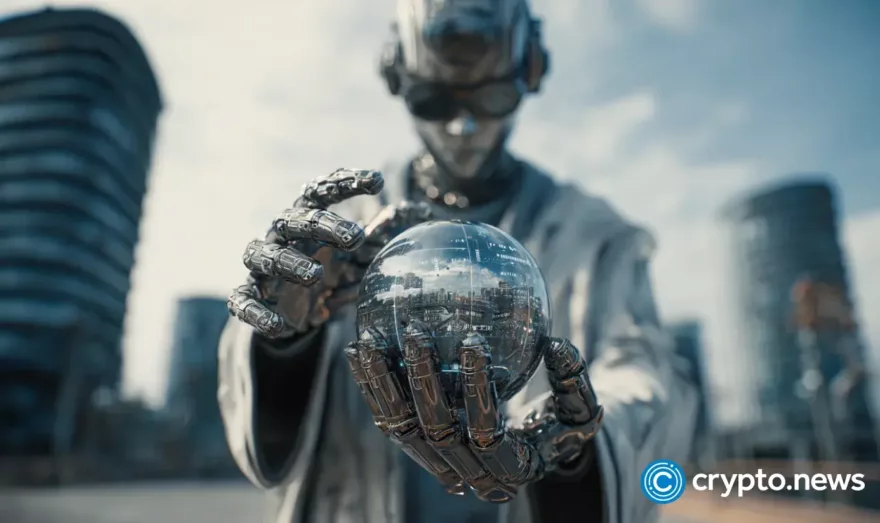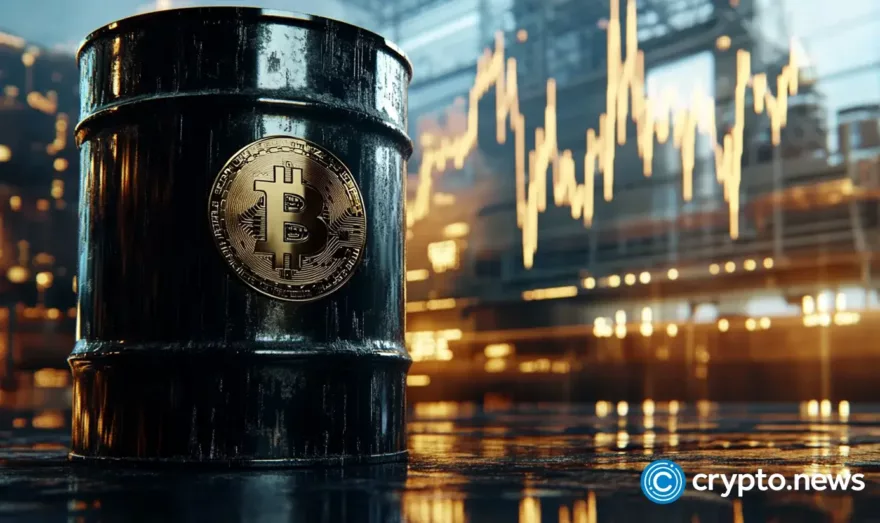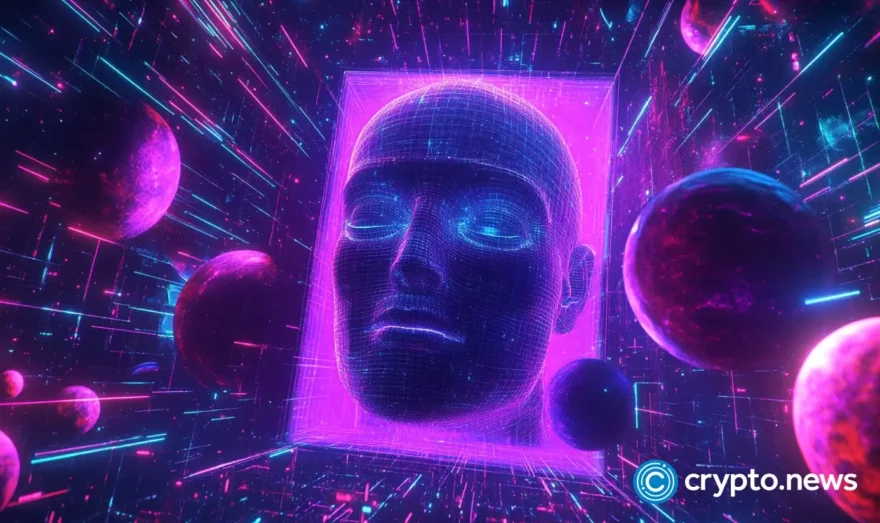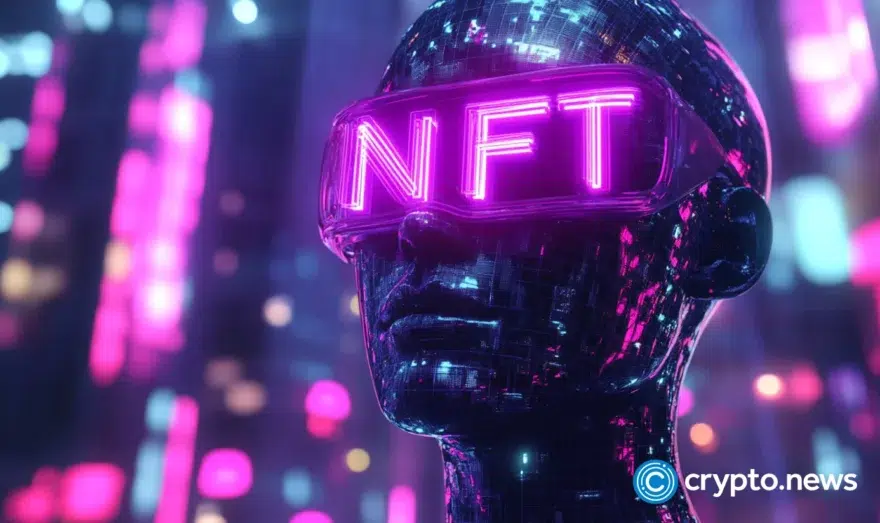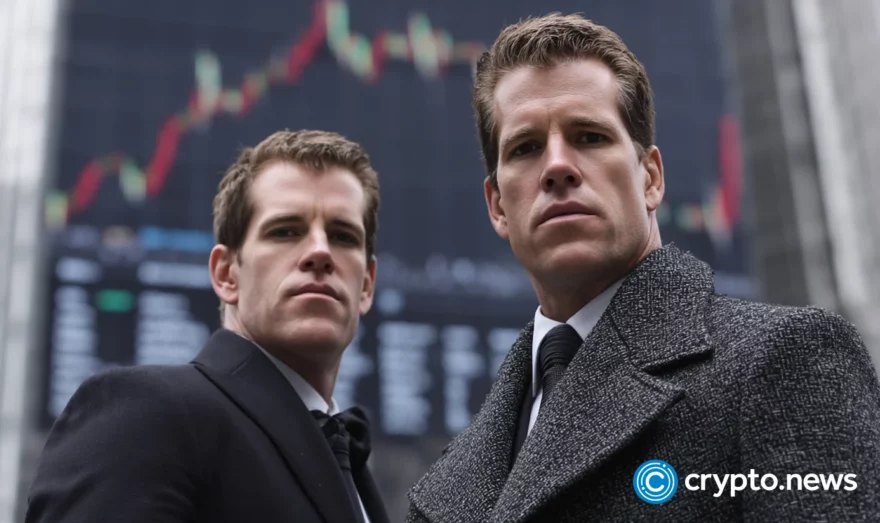Music NFT: What is It and How It Works?
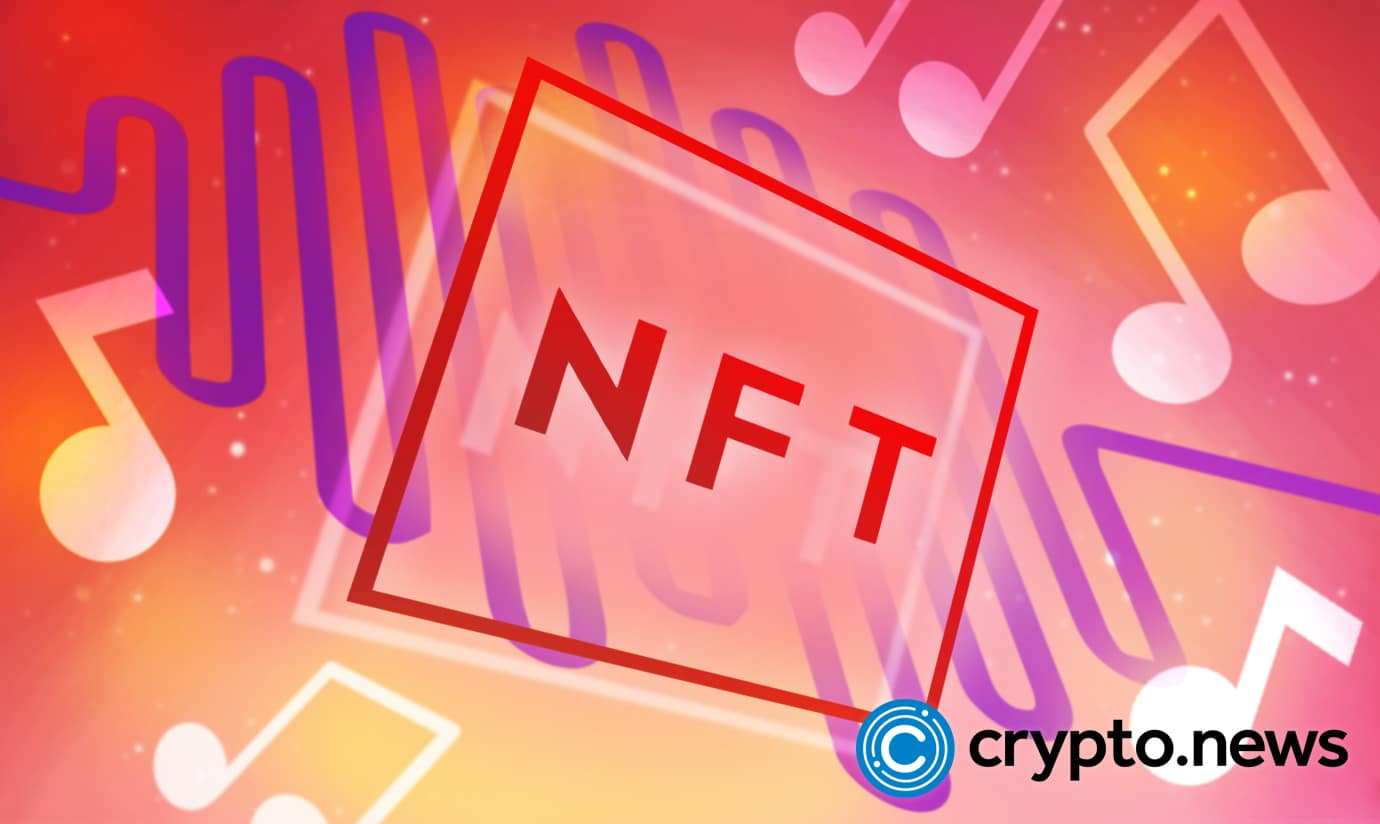
Music NFTs are unique cryptographic tokens recorded on a blockchain designed to represent music alongside art, contracts, images, and books. With the advent of NFTs, various industries, particularly the creative sector, have witnessed a transformative shift. One notable change is its recognition of creators, enabling them to assert ownership and receive proper credit for their work.
This comprehensive guide delves into the world of music NFTs, exploring their definition, functionality, and profound impact on the music industry. Additionally, we showcase noteworthy music NFT releases that have left an indelible mark on the industry’s landscape.
NFT Music Meaning
Music NFTs are music files that have been recorded (or “minted”) on a blockchain as unique digital tokens. Like all other NFTs, music NFTs provide the buyer with cryptographically verifiable ownership.
Moreover, music NFTs allow artists to embed royalty payments, enabling them to earn every time their NFTs are sold by the owner to another fan, for example.
How do music NFTs work?
Musicians have faced a lot of challenges when creating and distributing their works. In many cases, artists need to be represented by a manager and a music label that provides them with the platform to thrive.
Unfortunately, this is not the case for many artists. Instead, artists have found themselves in dead-end contracts that stifle their independence and take away their rights to earn from their works.
Music NFTs aim to help to solve this problem.
When an artist creates an NFT of their work, be it music or merchandise, they have the sole right to sell and distribute it on different platforms and, consequently, cut off the “middleman,” which in many cases is the record label.
To create an NFT, the musician needs to identify what they want to bring to the market. They may decide to sell an audio file, signed merchandise, a ticket to a performance, or anything else they deem valuable to their fans.
Music NFT Types
The artist can decide to create a single NFT, a limited number of NFTs, or an unlimited number.
1/1 (One of One)
A 1/1 music NFT represents a unique, singular edition of the asset. It means that there is only one copy of the NFT in existence, making it the most exclusive and rare edition.
Open edition
Open Edition refers to an NFT collection in which the creator can mint and sell an unlimited number of NFTs. However, it’s not always unlimited; oftentimes, the creator will mint only for a specific period and stop after that.
Limited edition
This is the opposite of open-edition NFTs. Here, the creator only mints a fixed number of NFTs and can not exceed that number. The relative scarcity means that this type of NFT is more likely to increase in value.
In some cases, musicians mint each track on an album as an NFT and sell them individually. In others, they sell the whole album as an NFT collection. It mostly depends on the artist’s preference.
Copyrights NFTs
Musicians can allow fans to invest directly in their copyrights by selling NFTs. They’ll divide a percentage of their royalties into a fixed number of NFTs that people can buy. Buyers then get a cut of the royalties depending on the number of NFTs they own.
Collectibles
Musicians also sell NFTs that don’t come with any royalty rights. Instead, they are just collectibles that the owners keep and sell later if they wish.
Tools for NFT Music
After musicians decide which type of NFTs to create, they choose an NFT marketplace to mint their NFT. Here are some of the popular marketplaces that sell music NFTs.
OpenSea
OpenSea is one of the top five most popular NFT marketplaces. It lets music creators list their songs as NFTs for other people to buy them. This marketplace features songs from some of the biggest music names, such as Snoop Dogg. Users can explore the large collection and purchase just the songs they want.
AirNFTs
AirNFTs is yet another popular NFT marketplace. Anyone is free to create and list their music for a small fee. It collects no royalties, so creators keep the whole of their revenue. This platform works with different blockchains, including Ethereum, Binance Smart Chain, and Fantom.
Future Tape
Future Tape is a platform designed solely for music NFTs. You can identify good artists and buy their music as NFTs. This platform utilizes USDC as its main currency. It was created by the same team behind Hype Machine, a popular music blog aggregator.
Audius
Audius is a blockchain-based music streaming platform. You can listen to new artists and earn token rewards using the app. Musicians who upload their music also earn rewards, keeping the community vibrant.
Audius is available to download on the Google Play Store and Apple App Store. It works exactly like popular music streaming platforms like Spotify and Apple Music but on the blockchain.
Royal
Royal enables anyone to invest in music on the blockchain. You can buy music rights in the form of NFTs and earn a cut of royalties when people stream the song. It’s a platform for finding artists you think have good growth potential and buying rights to their music early. This way, you can potentially earn income if the artist’s viewership increases or sell your rights to someone else. It’s like being a one-man record label.
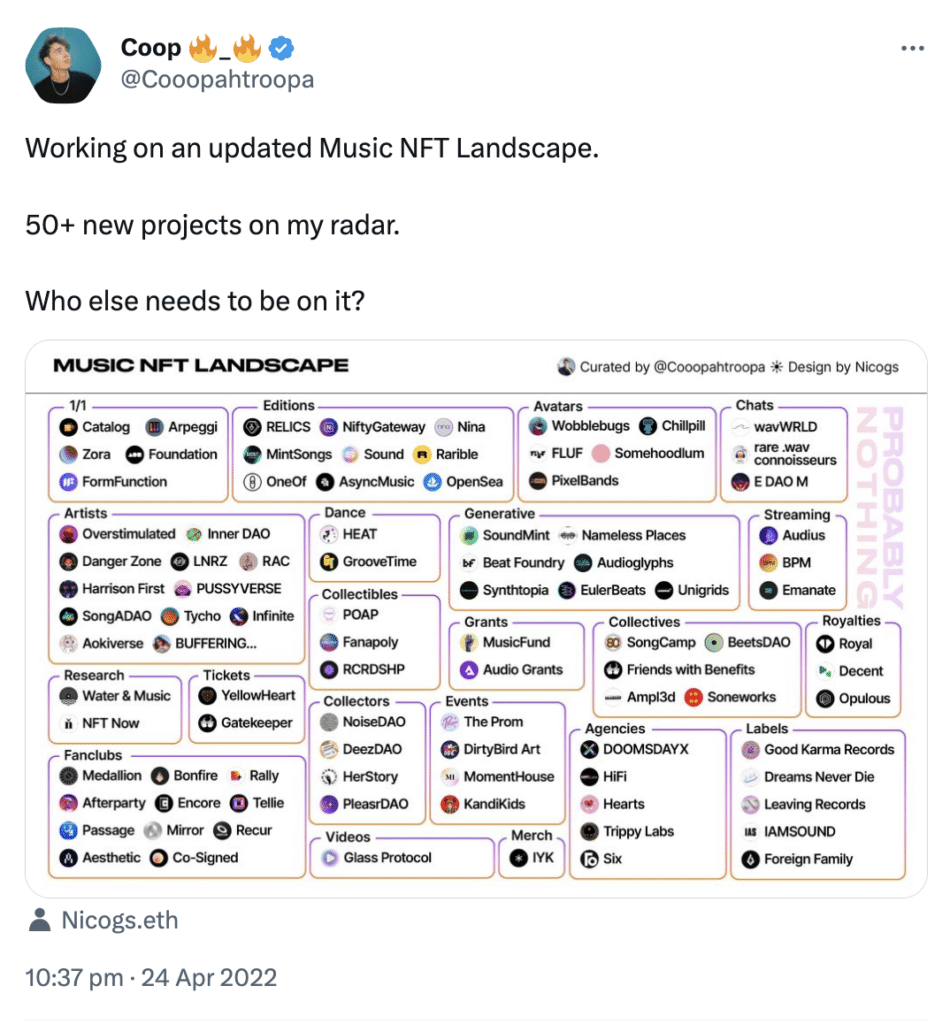
Benefits for artists during NFT music production
The rise of music NFTs has numerous advantages for artists and fans. Some of these include ensuring that musicians earn royalties whenever their NFT is sold, cutting out exploitative intermediaries, providing a platform for new musicians to share their music without being associated with a record label, and helping them build an active and interactive fanbase.
Direct ownership
NFTs give artists direct ownership of their work. They don’t have to share a steep percentage of sales with record labels, as with most mainstream artists. They can just list their music on NFT platforms and keep most of the revenue.
For instance, famous rapper Snoop Dogg claimed to earn over $40 million from selling his twentieth studio album as NFTs and kept the majority of the money. This would hardly be impossible in the traditional music industry.
Fundraising
It is difficult for an upcoming artist to fund their projects. But they can raise funds by selling rights to their music in the form of NFTs. It’s just like selling shares in your talent and using the proceeds to fund artistic endeavors. People who buy the rights will financially benefit if the artist grows bigger.
In March 2021, 3LAU (pronounced Blau), a popular DJ, raised over $11 million by selling NFTs granting digital rights to their buyers.
Recurrent income
Music creators can earn royalties each time their NFT gets sold. Normally, an artist collects royalty only once when they sell a physical copy of their music. However, NFTs are signed on the blockchain, and the artist collects royalties each time their music NFT is transferred between different owners.
Low entry barrier
NFTs lower the barrier to entry for upcoming artists. Anyone can sign up and distribute their music on any NFT platform. No industry gatekeepers exist to stop them because the blockchain sector is mainly decentralized. Blockchain has democratized creative endeavors to an enormous extent.
Broad options for distribution
There are endless NFT platforms where artists can sign up and distribute their works. Every artist can find just the one that fits their needs and requirements.
Community building
Community is key in the blockchain sector. NFTs make it easier for artists to build a following and interact with their fans more deeply. For instance, they can reward their fanbase with tokens, sell members-only merchandise, organize Discord groups, etc.
NFTs help artists engage with their community in ways that were hardly possible before.
Authenticity
A good thing about the blockchain is that it’s very transparent. Anyone can verify which wallet owns a particular NFT and how many times that NFT was sold. It makes it easy to verify which artists have a large following and which don’t.
Easy to implement
NFTs and NFT marketplaces are relatively easy to work with. Artists don’t necessarily need a technical team to handle their distribution and fan interaction. This favors upcoming artists without large budgets or the backing of a record label to handle administrative tasks.
Benefits for fans buying NFT music
Music rights
Fans can buy rights to the work of artists they like. This way, they’ll share in royalties earned from the particular music. If you buy rights to the work of an upcoming artist, the value of the rights may increase if the artist becomes popular and potentially earn you a return on investment.
Support
Fans can support musicians they like by buying their NFTs. For instance, you can help fund the production of an album for an artist that you like. If that artist becomes successful, you’ll be happy that you played a part in their success.
Interaction and engagement
Artists often grant special perks to people who purchase their NFTs. For instance, buyers can get one-on-one calls, concert tickets, attend meet and greets, etc. It helps people connect better with the artists that they love.
For instance, Mastercard, the popular payments network, introduced an NFT in April 2023, granting owners perks such as access to virtual events and an AI-powered music generator app.
Long-term ownership
Whenever you buy a music NFT, it belongs to you for as long as you want. NFTs are signed on a blockchain, and no one can replicate them without your permission. You’ll retain control over the NFT and any associated perks unless you decide to sell it.
Potential profit
You can sell your NFTs any time. If you buy an NFT granting you rights to royalties from music and that music grows more popular, you can sell your NFT for a profit. Similarly, if you buy a limited edition NFT, the relative scarcity means it’ll likely appreciate if the artist becomes more popular. However, there’s also a risk of financial loss if the popularity of the artist or the music decreases, or if the overall market for NFTs declines.
Accessibility
NFTs have democratized access to investment classes such as music rights. Before the blockchain became prominent, music rights were only open to people with significant capital or connections in the music industry. However, anyone can now sign up on an NFT marketplace and buy music rights.
High-profile NFT music releases
Many musicians have already started reaping the benefits of music NFTs. Below, we highlight some of the most notable NFT music releases and projects to date.
In December 2021, one of Whitney Houston’s unreleased demo tracks was sold on the OneOf marketplace for a whopping one million dollars. The music NFT also included some footage of the late Whitney Houston, which was compiled by an artist known as Diana Sinclair. This release was one of the most successful NFT sales in music NFT history.
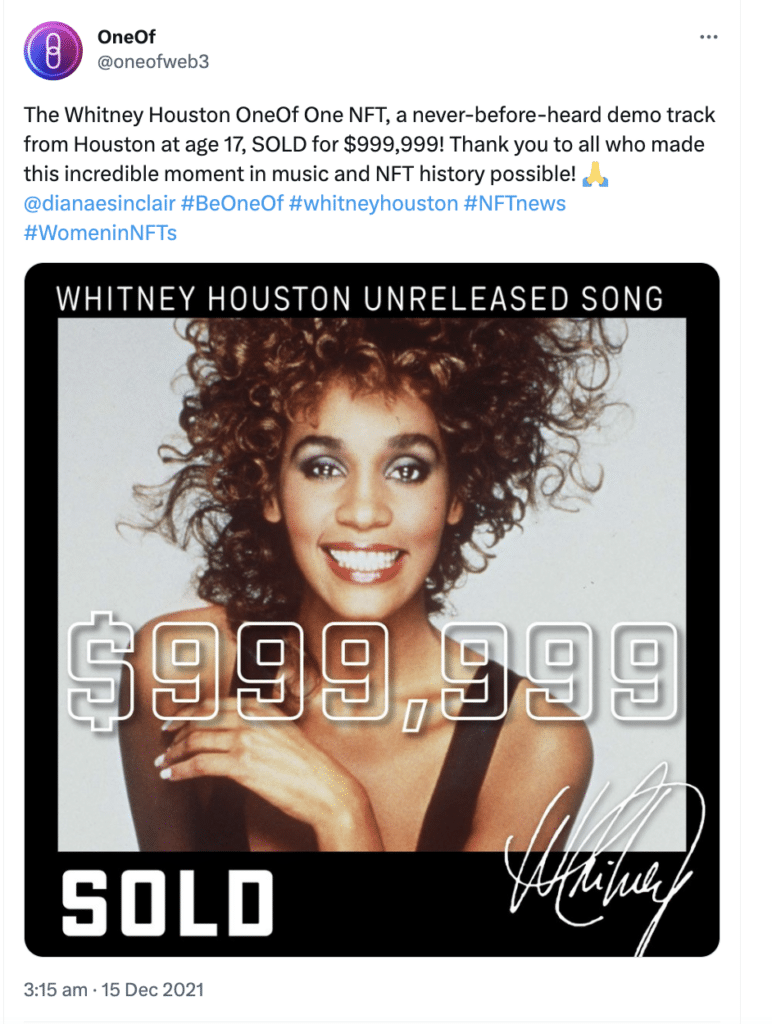
Another successful NFT release was by 3LAU, a DJ and producer. His collection consisted of 33 NFTs, with one of them being a custom song with creative direction from the buyer, which was sold for $3.67 million. In the same year (2021), there were other releases by various artists, such as a collection of 10 NFTs by Grimes, which sold for $10 million. In 2022, French Montana dropped an NFT album, and Snoop Dogg and Whiz Kalifa launched music NFTs based on the Bored Ape Yacht Club.
2022 has also seen some progress in the music NFT space, with Nas dropping his collection of 1870 NFTs in collaboration with 3LAU and the Coachella festival, selling their tickets, collectibles, art prints, and more as NFTs.
FAQs
What is the best music NFT platform?
There are numerous NFT marketplaces that allow users to mint, sell, and purchase music NFTs. The top NFT platforms like OpenSea currently lead the way in music NFTs.
Can audio be an NFT?
Yes. Audio recordings, such as a song, can be tokenized into an NFT on leading NFT platforms that allow users to create and mint non-fungible tokens (NFTs).
How much does it cost to make a song NFT?
The cost of minting a tokenized song as a music NFT can range from a few dollars to several hundred dollars. It depends on the NFT platform you are using as well as blockchain fees.








